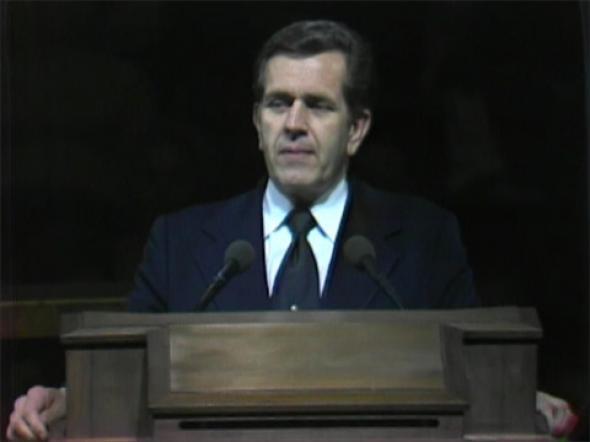The following is an excerpt from then Elder Boyd K. Packer's April 1975 general conference talk, "An Appeal to Prospective Elders," during which he sang a nursery song in Japanese. To watch the song, skip to 6:13 in the talk.
During World War II, I was a pilot in the Air Force. After service in the Pacific Islands, I spent a year in Japan with the occupational forces. It was, of course, advisable to learn a few words of Japanese. We needed at least to be able to ask directions, ask for something to eat.
I learned the common greetings and a few of the numbers and the salutations, and like many other members of the Church, I spent all my off-duty hours in missionary work among the Japanese people; and I learned from them those few words of what I thought was a very difficult language.
In July of 1946 the first baptisms took place in Osaka. Brother and Sister Tatsui Sato were baptized. And while they had been taught for the most part by others, I was privileged to baptize Sister Sato.
Though we were not unhappy in Japan, there was really only one thing on our minds, and that was home! I had been away for nearly four years. The war was over, and I wanted to go home.
When that day finally arrived, I supposed never to return to Japan, and I just closed that chapter.
The next years saw me busy getting an education, raising a family. I was not around Japanese people and had no occasion to use those few words that I had learned. They were left in the dim and very distant past, erased by 26 years of forgetting—gone, as I thought, forever. Then came an assignment to Japan.
The morning after my arrival in Tokyo, I was leaving the mission home with President Abo when a Japanese elder spoke to him in Japanese. President Abo said that the matter was urgent and apologized for the delay.
He went through some papers with the elder, discussing them in Japanese. Then he held up one of the letters and, pointing to a sentence, he said, “Korewa …”
And before he could complete the sentence I had completed it in my mind. Korewa nan desuka. I knew what he was saying. I knew what he was asking the elder. Korewa nan desuka means “What is this?” After 26 years, having been back in Japan but overnight, a sentence had come back into my mind—Korewa nan desuka, “What is this?”
I had not used those words in 26 years. I had thought that I should never use them again. But they were not lost.
I spent ten days in Japan and concluded my tour in Fukuoka. The morning I was to leave, we drove to the airport with Brother and Sister Watanabe. I was in the backseat with their children practicing my long-lost words of Japanese on them. They, in delight, were teaching me some new ones.
And then I recalled a little song that I had learned those 26 years before, and I sang it to those children:
Momotaro-san, Momotaro-san Okoshi ni tsuketa kibi dango Hitotsu watashi ni kudasai na
I think that may make Brother Ottley restless, but …
Sister Watanabe said, “I know that song.” And so we sang it together to the little children and then she told me the meaning of it, and as she did so, I remembered that also.
It is the story of a Japanese couple who were childless, and they had prayed for a son. One day, in the stone of a large peach, they found a little boy and they named him Momotaro. The song recounts his heroism in saving his people from a terrible enemy.
I had known that song for 26 years, but I didn’t know that I knew it. I had never sung the song to my own children. I had never told them the story of it. It had been smothered under 26 years of attention to other things.
I have thought that a most important experience and realized finally that nothing good is ever lost.

